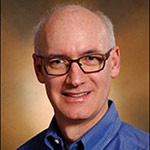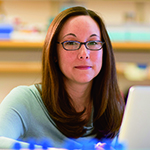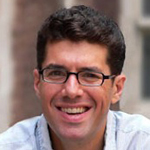Three faculty members at Washington University in St. Louis are among 347 new fellows named by the American Association for the Advancement of Science (AAAS), the world’s largest general scientific society. David W. Piston, PhD; Shelly E. Sakiyama-Elbert, PhD; and Jeffrey M. Zacks, PhD, will receive the highest honor awarded by AAAS in recognition of their distinguished efforts to advance science or its applications.
The three new Washington University fellows will be formally announced in the Nov. 27 issue of Science and honored Feb. 13 during the 2016 AAAS Annual Meeting in Washington, D.C.

David W. Piston
Piston, PhD, the Edward Mallinckrodt Jr. Professor and head of the Department of Cell Biology and Physiology, is known for his groundbreaking work with fluorescent imaging techniques, which use lasers, glowing molecular tags and other tools to measure and monitor biological processes in cell cultures and in living organisms. Much of his research focuses on the complex relationship among diabetes, blood glucose and the secretion of pancreatic hormones.
He was elected as an AAAS fellow for his contributions to developing and disseminating quantitative imaging and mathematical modeling methods, and applying these methods toward understanding the regulation of pancreatic hormone secretion.
Piston studies the regulation of glucagon, a pancreatic hormone that raises blood sugar levels and that is abnormally elevated in diabetes. Severe diabetes is treated with insulin, which lowers blood sugar levels. Piston believes a better understanding of how the antagonistic relationship between glucagon and insulin works will help scientists develop improved treatments for diabetes.
Piston is a fellow of the American Physical Society. His past honors have included the Woodrow W. Patterson Award and the Stanley Cohen Award, both from Vanderbilt University; an Arnold and Mabel Beckman Foundation Young Investigator Award; and a Nikon Fellowship at Woods Hole Laboratory.
He earned his PhD in physics at the University of Illinois and completed a postdoctoral fellowship in biophysics at Cornell University.

Shelly E. Sakiyama-Elbert
Sakiyama-Elbert, professor of biomedical engineering and vice dean for research in the School of Engineering & Applied Science, is being recognized for her fundamental contributions to advanced biomaterials and for leading research on nerve regeneration systems.
Her research focuses on developing biomaterials for drug delivery, as well as cell transplantation for the treatment of peripheral nerve and spinal cord injury. She is a member of the Hope Center for Neurological Disorders and Institute of Materials Science and Engineering at Washington University, as well as co-director of the recently established Center of Regenerative Medicine.
Sakiyama-Elbert earned bachelor’s degrees from Massachusetts Institute of Technology in chemical engineering and biology and a master’s and PhD from California Institute of Technology in chemical engineering. Her research is funded by the National Institute of Neurological Disorders and Stroke, and the National Institute of Arthritis and Musculoskeletal and Skin Diseases.
She has written five book chapters, nine patents and more than 70 journal articles. She is associate editor for biotechnology and bioengineering and an assistant editor for the Journal of Biomedical Materials Research.
Sakiyama-Elbert joined the College of Fellows for the American Institute for Medical and Biological Engineering in 2011, and was elected a fellow of the Biomedical Engineering Society in 2013. She also serves on the board of the Society for Biomaterials. At Washington University, she was co-president of the Association of Women Faculty from 2012-14, and a Provost Faculty Fellow from 2012-13.

Jeffrey M. Zacks
Zacks, professor of psychological and brain sciences in Arts & Sciences and of radiology in the School of Medicine, is being honored for distinguished contributions to the field of psychology, particularly understanding the neural and cognitive underpinnings of event cognition and mental imagery.
Zacks’ research explores what happens in the brain as we observe the world around us, including how representations in the brain and the world work together in perception and cognition. He teaches courses on “The Cognitive Neuroscience of Film” and “Advanced Cognitive Psychology.”
He serves as associate chair of psychology and directs the Dynamic Cognition Laboratory. He earned a bachelor’s degree in cognitive science from Yale University, and his PhD in cognitive psychology from Stanford University in 1999.
Zacks has worked or consulted at Bell Communications Research, Los Alamos National Laboratory and Interval Research. His research has been funded by the Defense Advanced Research Projects Agency, the National Science Foundation, the National Institutes of Health, and the James S. McDonnell Foundation.
He has served as associate editor of several leading journals and as chair of the governing board of the Psychonomic Society, the leading association of experimental psychologists. His scientific award and honors include fellowships with the Association for Psychological Science, the Midwest Psychological Association, and the Society of Experimental Psychologists.
Zacks is author of “Flicker: Your Brain on Movies” (2014) and co-author of “Event Cognition” (2014). He has published more than 70 journal articles and also has written for Salon, Aeon and The New York Times.